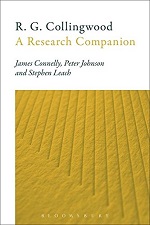Posts com a Tag ‘LEACH Stephen (Aut)’
R. G. Collingwood: A Research Companion – CONNELLY et al (IJHLTR)
 CONNELLY, James Connelly; JOHNSON, Peter Johnson; LEACH, Stephen. R. G. Collingwood: A Research Companion. London: Bloomsbury, 2015. 293p. Resenha de: HUGHES-WARRINGTON, Mamie. International Journal of Historical Learning Teaching and Research, London, v.13, n.2, p.14-15, 2016.
CONNELLY, James Connelly; JOHNSON, Peter Johnson; LEACH, Stephen. R. G. Collingwood: A Research Companion. London: Bloomsbury, 2015. 293p. Resenha de: HUGHES-WARRINGTON, Mamie. International Journal of Historical Learning Teaching and Research, London, v.13, n.2, p.14-15, 2016.
In 1992, I became the fortunate owner of a small photocopied guide to the R. G. Collingwood papers in the Bodleian Library, Oxford. This much-thumbed, much-annotated booklet became the first item in a collection of transcriptions and notes that soon spilled over the limits of a single folder and settled into a row of boxes that continues to grow today.
Such was the lot of a researcher on the life and works of Robin George Collingwood (1889– 1943), philosopher, archaeologist, historian and luminary of Oxford University in the first half of the twentieth century. Until now. Connelly, Johnson and Leach’s companion for researchers admirably fulfils its aims of providing a comprehensive and systematic listing of materials by and on Collingwood and of placing those materials in the context of a detailed chronology of his life (p. 2).
The book is helpfully divided into eight sections, covering a biography, a chronology of life events, letters, unpublished and published works by Collingwood and his commentators and details of the many archive holdings. The largest section – a description of correspondence – is arguably the most helpful, for the volume and scattered nature of holdings provides a considerable challenge to any budding researcher. The chronology is also a powerful aide to understanding Collingwood’s battle with failing health, which he describes rather poignantly in a 1941 letter to Christopher Hawkes as the time ‘since the superincumbent sword of Damocles became clearly visible, and here I am driving a pen, though not well’ (p. 137).
To those who would argue that it is an important rite of passage for new researchers to find materials for themselves, the simplest rebuttal is that comprehensive aids for research assist in the development of a comprehensive and nuanced understanding of the ideas and life events of individuals and groups. Moreover, they minimise the risk of misunderstandings that arise from not having considered particular materials, protecting students, early career researchers and those interested in Collingwood because of his connections to others from the dreaded ‘but you haven’t read x’ of the experienced Collingwood researcher.
There is a little to quibble about the book. The biography (pp. 3–6) gives the reader little sense of The Idea of History as a posthumous collection brought together by Collingwood’s student, T. M. Knox, or of the significant discovery in 1993 of missing chapters from The Principles of History in the basement of Oxford University Press. The published Collingwood is only the tip of an extensive manuscript collection that shows the evolution of his thought at work.
Nor does the book give the reader a sense of what to expect when they see a Collingwood manuscript for the first time. Collingwood’s handwriting is far from challenging as far as philosophers go, and his use of recycled exam scripts provide a helpful reminder of the Oxford in which he worked. But readers do need to be warned about his liberal use of ancient Greek terms, as well as his predilection for quoting from poems without noting their source. What was customary intertextual reference in Oxford of the 1930s can take the present day reader by surprise, and the best remedy is to begin with the revised editions of Collingwood’s philosophical work – starting notably with David Boucher’s edition of The New Leviathan (1992) – as they contain transcriptions and explanatory notes to a significant group of manuscripts.
Finally, the collection does not explicitly give the reader a sense of the balance of Collingwood’s interests in toto, as distinct from a year-by-year summary. This is a significant gap, as an analysis of the Collingwood corpus can remind us not to pass over his contributions to aesthetics when we see the vast lists of writings on archaeology, metaphysics and the philosophy of history.
But these are minor quibbles, and given the significant opportunities for research posed by a still largely untapped group of writings, this Research Companion is a welcome introduction to those new to Collingwood studies.
Marnie Hughes-Warrington – Australian National University, Australia. E-mail: marnie.hughes-warrington@anu.edu.au.
[IF]
